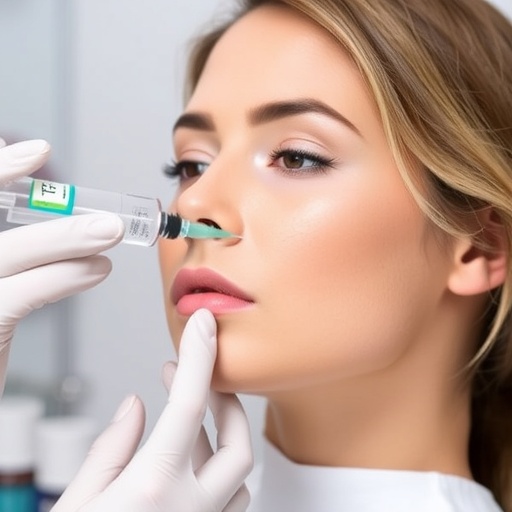In a landmark investigation representing the most extensive survey conducted in the United Kingdom on cosmetic injectable procedures, disturbing discrepancies have emerged regarding the quality of care and patient information imparted during botulinum toxin treatments. This peer-reviewed study, spearheaded by researchers from Anglia Ruskin University in collaboration with KLNIK and published in the Aesthetic Surgery Journal Open Forum, delves into patient experiences, treatment outcomes, and regulatory landscapes surrounding the use of botulinum toxin, widely known by the commercial name Botox.
The UK performs nearly a million cosmetic anti-wrinkle injections annually, yet it remains an anomaly among affluent nations because non-healthcare professionals can legally administer botulinum toxin with minimal regulation or oversight. This regulatory vacuum presents significant challenges in safeguarding patient welfare, as the administration of neurotoxic substances demands stringent clinical governance to mitigate risks.
The government has acknowledged these risks, proposing stricter legislative frameworks aimed at tightening the oversight of cosmetic injection practices. These reforms are currently under scrutiny through public consultation and parliamentary review. Notably, an overwhelming 89% of the 919 surveyed individuals expressed support for enhanced regulatory measures, underscoring the public’s desire for safer and more accountable practices.
The study cohort was predominantly female, accounting for 91% of respondents, with a majority having undergone more than five anti-wrinkle treatments. Intriguingly, many treatments occurred in aesthetic settings such as beauty clinics, which underscores the blurring lines between medical and cosmetic service providers in the UK. The predominant motivation for receiving botulinum toxin was anti-aging, highlighting societal pressures and the ubiquitous quest to defy visible signs of aging.
Despite legal mandates that botulinum toxin injections require a qualified prescriber’s involvement, only 42% of patients reported a prescriber’s presence during their consultation phase. Concerningly, nearly one in ten patients did not receive a written consent form. Even more troubling is that 18% of respondents were not apprised of potential complications, revealing a pervasive gap in informed consent protocols—a cornerstone of ethical medical practice.
Aftercare emerges as another critical deficiency; merely a quarter of individuals reported receiving any form of post-procedural support, while just 28% were advised on managing possible adverse effects. This lack of structured aftercare increases the risk of unresolved complications and patient distress, underscoring the necessity for standardized follow-up procedures in cosmetic treatments.
Although patient satisfaction was broadly high, with 90% expressing contentment with their procedures, short-term side effects were frequently reported. These included bruising and swelling (26%), headaches (25%), and localized injection site pain (10%). Whilst long-term effects were rarer, developed resistance to botulinum toxin was noted in approximately 3% of respondents, pointing to immunogenicity issues that can compromise long-term therapeutic efficacy.
Formal complaints lodged post-treatment were relatively low at 5%, but strikingly, awareness of the UK’s Yellow Card reporting system—a pharmacovigilance tool managed by the Medicines and Healthcare products Regulatory Agency (MHRA)—was limited. Only 26% of participants were aware of it, and the vast majority remained uninformed about avenues for reporting adverse reactions, highlighting a systemic shortfall in patient education and safety monitoring.
Professor Lee Smith of Anglia Ruskin University, co-lead author of the study, described the current UK scenario as a “healthcare paradox” where botulinum toxin, a medically regulated drug, is extensively utilized in an unregulated aesthetic marketplace. He stressed that the absence of professional mandates for non-healthcare injectors hampers safety vigilance and reporting, potentially skewing the true incidence of complications.
Dr. Roshan Ravindran, an aesthetic physician and co-lead author, emphasized that while botulinum toxin is generally well-tolerated and efficacious when administered appropriately, the survey uncovered alarming lapses in ethical considerations such as informed consent and patient aftercare. The absence of consent documentation and failure to inform patients adequately about potential complications amount to critical breaches in medical standards.
Both experts highlight the imperative nature of the government’s proposed licensing schemes, urging that these frameworks encompass rigorous educational prerequisites, ethical guidelines, and enforceable quality standards. They argue that technical proficiency alone is insufficient; injectors must be trained in effective communication and holistic patient assessment to identify individuals with contraindications or psychological vulnerabilities, such as body dysmorphic disorder, ensuring they receive appropriate care rather than inappropriate cosmetic interventions.
This comprehensive survey illuminates a pressing need for regulatory overhaul in the UK’s burgeoning cosmetic injection industry. As the government advances towards statutory licensing, the establishment of standardized practice parameters, compulsory reporting mechanisms, and patient-centric care models remains vital to safeguarding public health. Until such structures are implemented, patients continue to face unpredictable standards, and the burden of adverse outcomes will inevitably fall upon the National Health Service.
Subject of Research: Cosmetic botulinum toxin injections and associated patient experiences, treatment outcomes, and regulatory challenges in the UK.
Article Title: Findings From the Great British and Northern Ireland Botulinum Toxin Survey: Treatment Outcomes, Patient Experience and Regulations From a Cross-Sectional Survey
Web References:
– Anglia Ruskin University: https://www.aru.ac.uk/
– Aesthetic Surgery Journal Open Forum article: https://academic.oup.com/asjopenforum/advance-article/doi/10.1093/asjof/ojaf115/8256366
– MHRA Yellow Card Scheme: https://yellowcard.mhra.gov.uk/
References:
DOI: 10.1093/asjof/ojaf115
Keywords: Cosmetic surgery, Medical treatments, Side effects, Health counseling, Medical products, Patient monitoring, Health care, Social surveys, Beauty, Aesthetics




